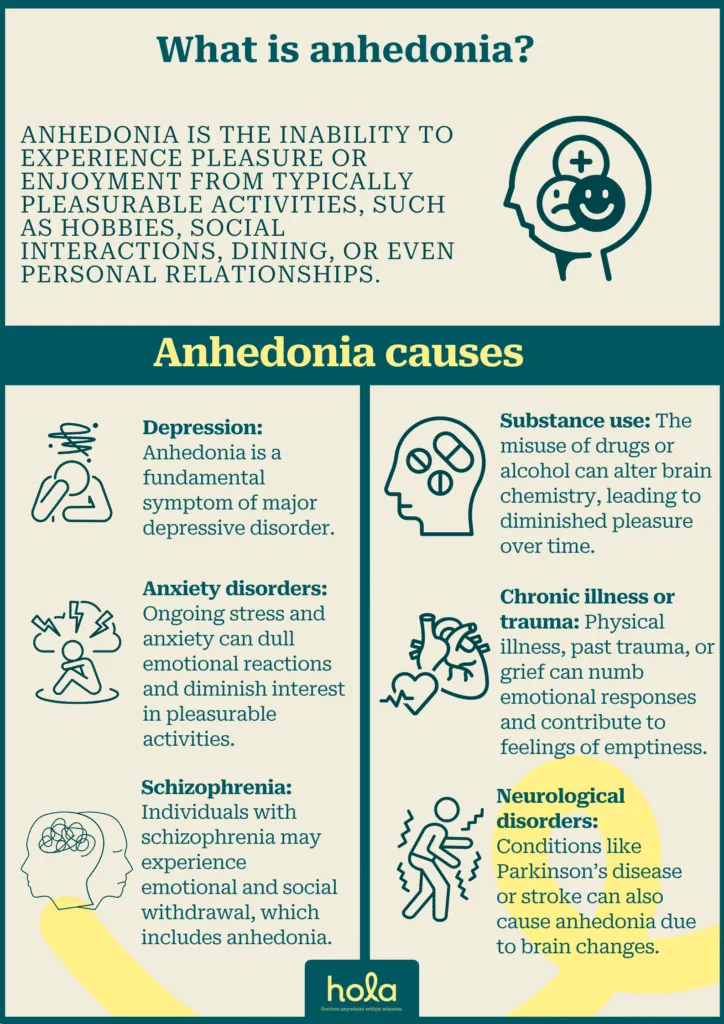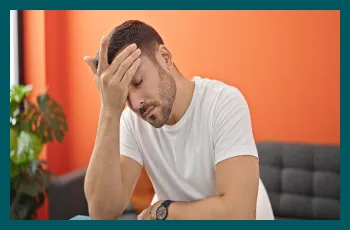When nothing feels good anymore: Understanding anhedonia
Written by editorial staff writer at Hola. Medically reviewed by Amira Shah, MA in Counselling Psychology, Registered Psychotherapist.

Contents

Summary: Anhedonia is the loss of interest or pleasure in activities that once brought satisfaction, and it’s a prominent feature of depression. Often mistaken with laziness, it’s a real emotional struggle. This emotional numbness can impact everyday life, but with the right support, therapy, and patience, recovery is possible, and happiness can return.
Ever had those days where nothing feels exciting anymore—not your favourite music, shows, or even your comfort food? It’s like your joy switch flipped off for no clear reason. This feeling is called anhedonia, and it’s more than just a rough patch; it’s a real and often misunderstood symptom of mental health issues. A study1 across several Asia-Pacific countries, including Australia, found that anhedonia affects around 52.5% of people with major depressive disorder (MDD). So, for more than half of those battling depression, it’s not just feeling low, it’s the absence of joy.
What Is anhedonia?
Anhedonia is the inability to experience pleasure or enjoyment from typically pleasurable activities, such as hobbies, social interactions, dining, or even personal relationships. This symptom frequently accompanies depression and other mental health disorders. Individuals suffering from anhedonia may feel emotionally numb, detached, or disinterested in life, even if they desire to feel otherwise. Identifying anhedonia is crucial since it often indicates a more significant issue that may require professional assistance.How it differs from general sadness or low mood
Anhedonia represents a loss of the ability to experience pleasure, whereas general sadness or low mood consists of feeling down while occasionally enjoying certain things. With sorrow, one may still experience happiness from music, food, or time spent with friends. In contrast, anhedonia makes even these enjoyable activities seem bland or unengaging. It tends to be deeper and more persistent, often associated with mental health issues such as depression.Types of anhedonia
There are various forms of anhedonia, including:- Social anhedonia: This involves a lack of interest in social interactions or relationships. Individuals may feel detached or indifferent towards being around others, including loved ones.
- Physical anhedonia: This refers to the inability to enjoy physical sensations like eating, touch, or intimacy. Activities that were once pleasurable no longer provide satisfaction.
Ready for positive change? Start your mental health care plan here.
Book an appointment
Fully bulk-billed, across Australia.
What does anhedonia feel like?
Anhedonia manifests as emotional numbness or emptiness. Activities that previously brought joy, like enjoying your favourite meal, being with loved ones, listening to music, or pursuing hobbies, feel dull or insignificant. You may feel a sense of disconnection from others and life itself, even if you wish to derive joy from these activities. It frequently coincides with low motivation, a lack of enthusiasm, and a sense of merely going through the motions without genuinely experiencing anything.What causes anhedonia?
Several underlying factors, primarily linked to mental health and brain chemistry, can trigger anhedonia. The primary causes include:- Depression: Anhedonia is a fundamental symptom of major depressive disorder, where the brain's reward system becomes impaired.
- Anxiety disorders: Ongoing stress and anxiety can dull emotional reactions and diminish interest in pleasurable activities.
- Schizophrenia: Individuals with schizophrenia may experience emotional and social withdrawal, which includes anhedonia.
- Substance use: The misuse of drugs or alcohol can alter brain chemistry, leading to diminished pleasure over time.
- Chronic illness or trauma: Physical illness, past trauma, or grief can numb emotional responses and contribute to feelings of emptiness.
- Neurological disorders: Conditions like Parkinson’s disease or stroke can also cause anhedonia due to brain changes.

Signs and symptoms of anhedonia
Indicators and symptoms of anhedonia include:- Loss of interest in activities or hobbies previously enjoyed.
- Feeling emotionally flat or numb.
- Withdrawing from socialising with friends, family, or gatherings.
- A lack of motivation to initiate or carry out tasks.
- Inability to experience joy, excitement, or contentment.
- Avoidance of physical touch or intimacy.
- Feeling disconnected from life or the environment.
- Decreased interest in food, music, or entertainment.
How it can affect daily life, work, and relationships
Anhedonia can significantly impact daily activities, work, and personal relationships. You might find it challenging to rise in the morning, concentrate at work, or maintain motivation with daily responsibilities. At home, hobbies and social gatherings may seem meaningless, resulting in withdrawal from friends and family. In relationships, partners or family members may feel excluded or perplexed by your emotional detachment. Over time, this emotional disconnection may lead to isolation, misunderstandings, and a decline in overall quality of life.How anhedonia differs from depression?
Anhedonia is considered a symptom, while depression is categorised as a mental health disorder. Depression encompasses a variety of emotional, physical, and cognitive symptoms, including ongoing sadness, tiredness, alterations in appetite or sleep, and a sense of hopelessness. In contrast, anhedonia denotes the inability to experience pleasure or maintain interest in activities. Although many individuals with depression experience anhedonia, not everyone who has anhedonia fulfils the complete criteria for depression.How can anhedonia be care & treated?
Addressing and treating anhedonia involves tackling both the symptom itself and its root cause, typically through a combination of the following methods:- Expert assistance: A healthcare provider or mental health expert can evaluate your symptoms and suggest therapies, medications, or a combination of both.
- Counselling: Cognitive Behavioural Therapy (CBT) and other types of psychotherapy can assist you in understanding emotional barriers, recognising thought patterns, and gradually reconnecting with activities and emotions.
- Medication: If anhedonia is associated with depression or another mental health issue, antidepressants or other types of medication may be beneficial in balancing brain chemistry and enhancing mood.
- Lifestyle modifications: Engaging in regular physical activity, maintaining a healthy diet, ensuring adequate sleep, and fostering social connections can aid in recovery, even if these actions don't initially seem enjoyable.
- Mindfulness and incremental goals: Practising mindfulness and setting small, attainable objectives can gradually restore a sense of interest and fulfilment.
Why is mental consultation important with the doctor?
Seeking mental health advice from a online doctor is vital as it aids in identifying, understanding, and effectively managing emotional and psychological challenges such as anhedonia, depression, anxiety, or stress. Medical professionals can provide expert recommendations, rule out physical issues, and develop a customised treatment strategy that might include therapy, medications, or lifestyle adjustments. Prompt consultations can help prevent symptoms from worsening and equip you with coping mechanisms. It’s an essential step toward recovery, enhancing your quality of life, and feeling more like your true self.Conclusion:
Feeling numb doesn’t mean you’re broken; it means your heart and mind are asking for support. Anhedonia is challenging, but with guidance, small efforts, and time, joy can find its way back. You’re not alone in this.FAQs
How can antidepressants cause anhedonia?
Antidepressants, particularly SSRIs (Selective Serotonin Reuptake Inhibitors), may sometimes cause anhedonia as a side effect. While these medications are meant to ease negative emotions like sadness or anxiety, they may sometimes also mute positive feelings, leading to a sense of emotional dullness. This occurs because SSRIs alter the brain’s chemical activity, especially serotonin levels, which can reduce emotional range. For some, this results in emotional numbness or disconnection from once-enjoyable experiences. Not everyone is affected this way, and if it happens, a healthcare provider can help by adjusting the dosage or switching medications.How can you recover from anhedonia?
Recovering from anhedonia involves professional guidance, lifestyle modifications, and patience. Therapy and medication adjustments can help address root issues like depression or side effects. Participating in familiar or new activities, even when they don’t feel enjoyable initially, can gradually reawaken your brain’s ability to feel happy. Mindfulness, regular physical activity, and staying connected with others also play a key role. The journey may be slow, so treat yourself with kindness and care.How common is anhedonia?
Anhedonia is a common symptom of major depressive disorder (MDD). Studies indicate that approximately 52.5% of people with MDD experience anhedonia, marked by a reduced interest or pleasure in activities once found fulfilling. This prevalence was observed in a large-scale study across the Asia-Pacific region, including Australia, Malaysia, and Japan.How do I know if I have anhedonia?
You might have anhedonia if you notice persistent loss of interest or pleasure in activities you once enjoyed, like hobbies, social gatherings, or comforting foods. You might experience feelings of emotional numbness, a sense of distance, or a lack of motivation for tasks. If these symptoms continue over time and begin to disrupt your routine, it’s important to reach out to a healthcare professional for proper evaluation and care.Is anhedonia the same as depression?
No, anhedonia is not the same as depression, but it is a major symptom of depression. Depression is a complex mental health disorder involving a range of symptoms like fatigue, sadness, disrupted sleep, and feelings of hopelessness. Anhedonia refers to the loss of interest in activities you once enjoyed. While it often occurs as part of depression, it doesn’t capture the full range of depressive symptoms.Is anhedonia a permanent condition?
Anhedonia is not always permanent. For many, it’s a symptom of mental health challenges like depression, anxiety, or unresolved trauma, and with effective treatment, it can improve or even go away completely. Healing may involve counselling, medications, lifestyle changes, or a combination of these. However, in some chronic or severe cases, anhedonia may last longer and require continuous care.What are small things I can do to feel better?
Here are some small, simple things you may try to help ease anhedonia and boost your mood:- Get some sunlight
- Do something you used to enjoy
- Practice deep breathing or meditation
- Connect briefly with a friend or loved one
- take short walks outside
- maintain a regular sleep schedule
- set small achievable goals
Anhedonia vs. apathy: Are they the same?
Anhedonia and apathy are related but not the same.- Anhedonia is the loss of interest or pleasure in activities you once enjoyed.
- Apathy is a lack of motivation, interest, or concern, often without emotional suffering.
Should I see a doctor if I think I have anhedonia?
Yes, it is important to consult a doctor or mental health specialist if you suspect you have anhedonia, particularly if it’s lasting more than a few weeks or is disrupting your daily life. Anhedonia may signal depression or another mental health condition, and a qualified professional can help identify the root cause and suggest appropriate treatment. Getting support early often leads to faster recovery.Can anhedonia be treated with telehealth or online therapy?
Yes, anhedonia can be treated through telehealth or online therapy. These platforms allow licensed therapists to address the emotional and psychological factors like depression or anxiety, using techniques like Cognitive Behavioural Therapy (CBT), activity scheduling, or mindfulness practices. If needed, online psychiatrists can also prescribe medications. It’s a flexible and convenient way to receive support, especially when face-to-face treatment isn’t feasible.Take control of your mental health. Begin your care plan now.
Book an appointment
Fully bulk-billed, across Australia.
What we treat
- Cough
- Nausea & vomiting
- Fever
- Hayfever
- Fatigue
- Sore throat
- Acne
- Hair loss
- Gout
- Eczema
- Rosacea
- Sunburn
- UTI
- Erectile dysfunction
- Contraception
- Morning sickness
- Morning after pill
- Prostate health
- Anxiety
- Depression
- Stress
- Grief & loss
- Antidepressants
- Premature ejaculation
- Asthma
- Blood pressure
- Blood thinners
- Diabetes
- Cholesterol
- Migraines & headaches
- Allergies
- Body ache
- Heartburn & reflux
- Sleep disorder
- Pain relief
- Gastro
Related Articles
What Is Online Therapy? Everything You Need To Know About e-Therapy
February 19, 2026Mental Health
...
Disclaimer
This blog is for general informational purposes only and does not indicate that Hola Health provides all treatments or preventive measures mentioned. It is not intended to be a substitute for professional medical advice. Always seek the guidance of your doctor or other qualified health professional with any questions you may have regarding your health or a medical condition. For emergencies please immediately contact 000. Any medical topics discussed are intended to educate, not to imply availability through Hola Health.
 Facebook
Facebook  X
X  Copy Link
Copy Link



